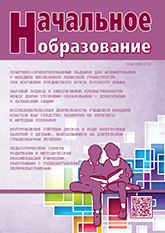Ekaterinburg, Ekaterinburg, Russian Federation
CSCSTI 14.15
CSCSTI 14.25
The article considers discovery learning as an effective tool for the formation of universal learning activities by younger schoolchildren: cognitive, regulative, communicative. The questions of the history of the discovery education are described, the most frequently used discovery teaching methods are characterized: “brainstorming” and the synectic method. Variants of discovery learning tasks for younger schoolchildren are suggested.
younger schoolchildren; universal learning activities; forms of heuristic learning; method of “brainstorming”; the synectic method; discovery learning task.
ЭВРИСТИЧЕСКИЙ МЕТОД ОБУЧЕНИЯ
Эвристическое обучение рассматривается в дидактике как освоение знаний через непрерывное открытие нового.
1. Glazyrina E.Yu. Evristika i distantsionnye tekhnologii v muzykal’nom obrazovanii [Heuristics and remote technologies in music education]. Izvestiya Ural’skogo federal’nogo universiteta [Izvestiya Ural Federal University]. 2011, I. 4, pp. 142-148.
2. Petukhova E.N. Evristicheskie metody obucheniya na urokakh russkogo yazyka kak sredstvo osvoeniya tekhnologii problemnogo obucheniya v usloviyakh realizatsii FGOS NOO [Heuristic methods of teaching in the lessons of the Russian language as a means of mastering the technology of problem training in the context of the implementation of the GEF NEO]. Pedagogicheskiy poisk [Pedagogical search]. 2015, V. 1, I. 2-1, pp. 9-15.
3. Ryabenko O.N. Evristicheskie metody organizatsii tvorcheskoy deyatel’nosti uchashchikhsya na urokakh tekhnologii [Heuristic methods of organizing students’ creative activity in technology lessons]. Psikhologiya i pedagogika: metodika i problemy prakticheskogo primeneniya [Psychology and pedagogy: methods and problems of practical application]. 2012, I. 28, pp. 138-142. EDN: https://elibrary.ru/RNFIMJ
4. Sadykova A.R. Organizatsiya evristicheskogo obucheniya [Organization of heuristic learning]. Aktual’nye problemy sovremennoy nauki [Actual problems of modern science]. 2010, I. 4, pp. 54-56.
5. Sadykova A.R. Evristika v kontekste innovatsionnosti kak vazhneyshego printsipa sovremennoy pedagogiki [Heuristics in the context of innovation as an important principle of modern pedagogy]. Aktual’nye problemy sovremennoy nauki [Actual problems of modern science]. 2010, I. 4, pp. 57-58.
6. Stolyarenko L.D. Psikhologiya i pedagogika vysshey shkoly [Psychology and pedagogy of higher education]. Rostov-on-Don, Feniks Publ., 2014. 377 p. EDN: https://elibrary.ru/SNTHNJ
7. Federal’nyy gosudarstvennyy obrazovatel’nyy standart nachal’nogo obshchego obrazovaniya [Federal state educational standard of primary general education]. Moscow, Prosveshchenie Publ., 2011. 32 p.
8. Khutorskoy A.V. Sovremennaya didaktika [Modern Didactics]. Moscow, Vysshaya shkola Publ., 2007. 639 p. EDN: https://elibrary.ru/QVMOUV
9. Shiryaeva N.S. Ispol’zovanie evristicheskikh tekhnologiy v rabote s zhanrami narodnogo tvorchestva [Use of heuristic technologies in work with genres of folk art]. Nachal’naya shkola [Primary school]. 2014, I. 12, pp. 34-35. EDN: https://elibrary.ru/TWDNXJ
10. Shuvanova O.V. Evristika i otkrytye zadaniya na urokakh geografii [Heuristics and open assignments in geography lessons]. Geografiya i ekologiya v shkole XXI veka [Geography and ecology in the school of the XXI century]. 2012, I. 2, pp. 52-54.






